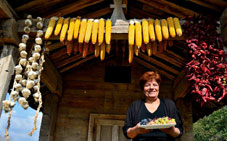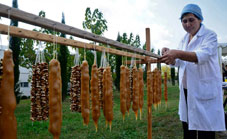Rural Women’s Day in Georgia
By Tatia Megeneishvili
Thursday, October 17


The event encompassed the exhibition/sale of locally- produced products by women farmers and the panel discussion including Chair of the Agrarian Issues Committee of the Parliament, Gigla Agulashvili, Deputy Minister of Agriculture, David Galegashvili, third Deputy Minister of Education and Science of Georgia, Tamaz Marsagishvili, Head of the Department of the National Curriculum and General Education Development, Natia Jokhadze, UN Resident Coordinator/UNDP Resident Representative in Georgia Niels Scott, First Secretary/Development Cooperation of the Embassy of Sweden, Peeter Kaaman, as well as Counsellor/Development Cooperation of the Embassy of Sweden, Eva Smedberg.
During her speech, Smedberg said that what she has seen in Kachreti was very impressive. “I am very proud of what I have seen here, I see how step-by-step, slowly but surely, Georgian women are moving forward. Sweden’s priority has always been development and the equality of women, I am proud when I see such progress,” she stated.
Agulashvili told the story of Muhammad Yunus, a banker from Bangladesh, who was giving low percent credits to women. “Georgian banks also have to present business credits, but not only for women. This program has been working since March 2013. All you need is a good business plan,” stated Agulashvili.
Women councillors and farmers raised a range of issues at the panel discussion, including the problems with drinking water and irrigation water supply, farmer’s cooperatives, pastures, land taxes and the most discussable issue pre-school education.
According to the UNDP, rural women in Georgia are not actively taking part in local-level decision-making while they are playing a decisive role in household nutrition and subsistence farming. The unequal division of labor at home leaves women with significantly less time for leisure and self-development than it is in the case with men.
According to official data, in rural areas, male-headed households represent 69.1%, and female-headed - 30.9%, while in urban areas, the division in is 61.2% and 38.8% respectively. Women represent only 10% of the local governance.
After the meeting in Kachreti, Agulashvili estimated the discussion very positively and said that he plans to meet with those women again. “They are amazing, with their ideas and views of the problem. The government must continue working with them and ensure their participation in the future work for solving those issues,” he stated.
This international date was established by the UN General Assembly in its resolution 62/136 of December 18, 2007, recognized “the critical role and contribution of rural women, including indigenous women, in enhancing agricultural and rural development, improving food security and eradicating rural poverty.” It has been celebrated worldwide since October 15, 2008.
The UN, with the financial support of the Swedish International Development Agency SIDA also implemented a joint programme To Enhance Gender Equality in Georgia. Three UN agencies are involved in this project, UNDP, UNFPA and UN Women.
